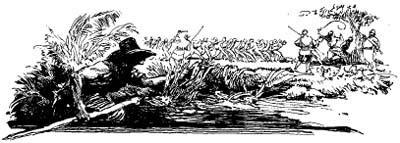The Savage Tales of Solomon Kane (48 page)
Read The Savage Tales of Solomon Kane Online
Authors: Robert E. Howard,Gary Gianni

A strong west wind was blowing and Kane flung handfuls of blood into the air for the scent to waft to the harpies in the hills. He cut the bull to pieces and carried its quarters into the hut, then managed to drag the huge trunk itself inside. Then he retired into the thick trees near by and waited.
He had not long to wait. The morning air filled suddenly with the beat of many wings and a hideous flock alighted before the hut of Goru. All of the beasts – or men – seemed to be there, and Kane gazed in wonder at the tall, strange creatures, so like to humanity and yet so unlike – the veritable demons of priestly legend. They folded their wings like cloaks about them as they walked upright and they talked to one another in a strident crackling voice that had nothing of the human in it. No, these things were not men, Kane decided. They were the materialization of some ghastly jest of Nature – some travesty of the world's infancy when Creation was an experiment. Perhaps they were the offspring of a forbidden and obscene mating of man and beast; more likely they were a freakish offshoot on the branch of evolution – for Kane had long ago dimly sensed a truth in the heretical theories of the ancient philosophers, that Man is but a higher beast. And if Nature made man y strange beasts in the past ages, why should she not have experimented with monstrous forms of mankind? Surely Man as Kane knew him was not the first of his breed to walk the earth, nor yet to be the last.
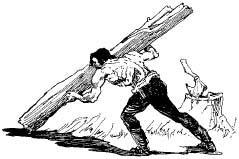
Now the harpies hesitated, with their natural distrust for a building, and some soared to the roof and tore at the thatch. But Kane had builded well. They returned to earth and at last, driven beyond endurance by the smell of raw blood and the sight of the flesh within, one of them ventured inside. In an instant all were crowded into the great hut, tearing ravenously at the meat, and when the last one was within, Kane reached out a hand and jerked a long vine which tripped the catch that held the door he had built. It fell with a crash and the bar he had fashioned dropped into place. That door would hold against the charge of a wild bull.
Kane came from his covert and scanned the sky. Some hundred and forty harpies had entered the hut. He saw no more winging through the skies, and believed it safe to suppose he had the whole flock trapped. Then with a cruel, brooding smile, Kane struck flint and steel to a pile of dead leaves next the wall. Within sounded an uneasy mumbling as the creatures realized that they were prisoners. A thin wisp of smoke curled upward and a flicker of red followed it; the whole heap burst into flame and the dry bamboo caught.
A few moments later the whole side of the wall was ablaze. The fiends inside scented the smoke and grew restless. Kane heard them cackling wildly and clawing at the walls. He grinned savagely, bleakly and without mirth. Now a veer of the wind drove the flames around the wall and up over the thatch – with a roar the whole hut caught and leaped into flame. From within sounded a fearful pandemonium. Kane heard bodies crash against the walls, which shook to the impact but held. The horrid screams were music to his soul, and brandishing his arms, he answered them with screams of fearful, soul-shaking laughter. The cataclysm of horror rose unbearably, paling the tumult of the flames. Then it dwindled to a medley of strangled gibbering and gasps as the flames ate in and the smoke thickened. An intolerable scent of burning flesh pervaded the atmosphere, and had there been room in Kane's brain for aught else than insane triumph, he would have shuddered to realize that the scent was of that nausea ting and indescribable odor that only human flesh emits when burning.
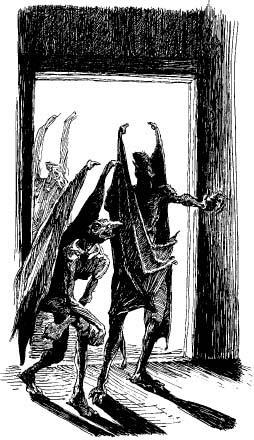
From the thick cloud of smoke Kane saw a mowing, gibbering thing emerge through the shredding roof and flap slowly and agonizingly upward on fearfully burned wings. Calmly he aimed and fired, and the scorched and blinded thing tumbled back into the flaming mass just as the walls crashed in. To Kane it seemed that Goru's crumbling face, vanishing in the smoke, split suddenly in a wide grin and a sudden shout of exultant human laughter mingled eerily in the roar of the flames. But the smoke and an insane brain play queer tricks.
Kane stood with the ju-ju stave in one hand and the smoking pistol in the other, above the smoldering ruins that hid forever from the sight of man the last of those terrible, semi-human monsters whom another white-skinned hero had banished from Europe in an unknown age. Kane stood, an unconscious statue of triumph – the ancient empires fall, the dark-skinned peoples fade and even the demons of antiquity gasp their last, but over all stands the Aryan barbarian, white-skinned, cold-eyed, dominant, the supreme fighting man of the earth, whether he be clad in wolf-hide and horned helmet, or boots and doublet – whether he bear in his hand battle-ax or rapier – whether he be called Dorian, Saxon or Englishman – whether his name be Jason, Hengist or Solomon Kane.

Kane stood and the smoke curled upward into the morning sky, the roaring of foraging lions shook the plateau, and slowly, like light breaking through mists, sanity returned to him.
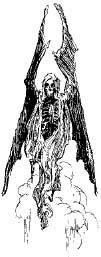
“The light of God's morning enters even into dark and lonesome lands,” said Solomon Kane somberly. “Evil rules in the waste lands of the earth, but even evil may come to an end. Dawn follows midnight and even in this lost land the shadows shrink. Strange are Thy ways, oh God of my people, and who am I to question Thy wisdom? My feet have fallen in evil ways but Thou hast brought me forth scatheless and hast made me a scourge for the Powers of Evil. Over the souls of men spread the condor wings of colossal monsters and all manner of evil things prey upon the heart and soul and body of Man. Yet it may be in some far day the shadows shall fade and the Prince of Darkness be chained forever in his hell. And till then mankind can but stand up stoutly to the monsters in his own heart and without, and with the aid of God he may yet triumph.”
And Solomon Kane looked up into the silent hills and felt the silent call of the hills and the unguessed distances beyond; and Solomon Kane shifted his belt, took his staff firmly in his hand and turned his face eastward.
The Footfalls Within
The Footfalls Within
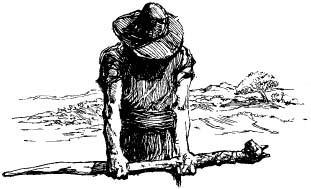
Solomon Kane gazed somberly at the black woman who lay dead at his feet. Little more than a girl she was, but her wasted limbs and staring eyes showed that she had suffered much before death brought her merciful relief. Kane noted the chain galls on her limbs, the deep crisscrossed scars on her back, the mark of the yoke on her neck. His cold eyes deepened strangely, showing chill glints and lights like clouds passing across depths of ice.
“Even into this lonesome land they come,” he muttered. “I had not thought –”
He raised his head and gazed eastward. Black dots against the blue wheeled and circled.
“The kites mark their trail,” muttered the tall Englishman. “Destruction goeth before them and death followeth after. Wo unto ye, sons of iniquity, for the wrath of God is upon ye. The cords be loosed on the iron necks of the hounds of hate and the bow of vengeance is strung. Ye are proud-stomached and strong, and the people cry out beneath your feet, but retribution cometh in the blackness of midnight and the redness of dawn.”
He shifted the belt that held his heavy pistols and the keen dirk, instinctively touched the long rapier at his hip, and went stealthily but swiftly eastward. A cruel anger burned in his deep eyes like blue volcanic fires burning beneath leagues of ice, and the hand that gripped his long, cat-headed stave hardened into iron.
After some hours of steady striding, he came within hearing of the slave train that wound its laborious way through the jungle. The piteous cries of the slaves, the shouts and curses of the drivers, and the cracking of the whips came plainly to his ears. Another hour brought him even with them, and gliding along through the jungle parallel to the trail taken by the slavers, he spied upon them safely. Kane had fought Indians in Darien and had learned much of their woodcraft.
More than a hundred blacks, young men and women, staggered along the trail, stark naked and made fast together by cruel yoke-like affairs of wood. These yokes, rough and heavy, fitted over their necks and linked them together, two by two. The yokes were in turn fettered together, making one long chain. Of the drivers there were fifteen Arabs and some seventy black warriors, whose weapons and fantastic apparel showed them to be of some eastern tribe – one of those tribes subjugated and made Moslems and allies by the conquering Arabs.
